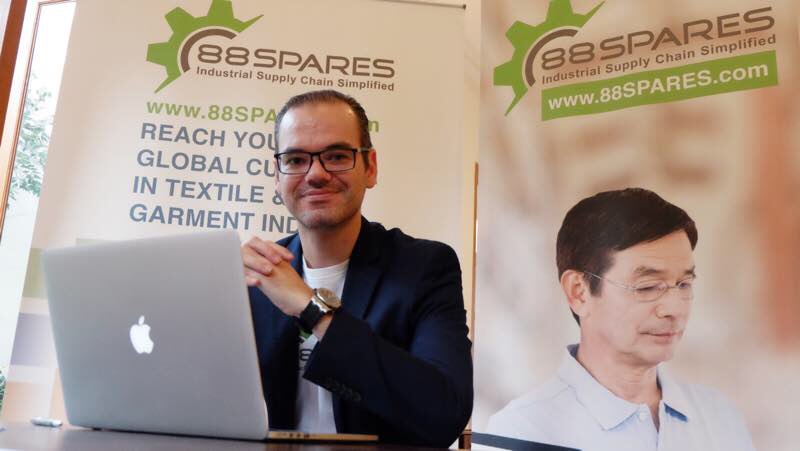Indonesia’s first B2B e-marketplace for industrial machine spare parts aims to broaden the horizons of the nation’s textile and garment industry. Caranissa Djatmiko sits down with German expat Hartmut Molzahn, CEO of 88Spares, to find out more
Hartmut Molzahn has lived in Indonesia for four years, enough time for him to observe the strong impact that the digital revolution has made on the archipelago’s business sectors.
He previously took on the role of Managing Director in a German trading company that supplies machines and spare parts to the international textile industry. His experience working in Indonesia made him see the value of business-to-business (B2B) e-commerce, particularly how it can simplify the supply chain and cut out unneeded middlemen.
88Spares is Indonesia’s first B2B e-marketplace that lets users buy and sell industrial machine spare parts directly, without needing to go through the usual supply chain, which involves intermediary brokers who earn a living hiking up prices for the end buyers.
Molzahn recalls his role at his previous trading company in Jakarta:
“During this time, I realized that technology can help make the market more efficient and transparent and help save a lot of customers money while helping suppliers increase their profits at the same time,” explained the startup CEO.
Identifying the inefficiencies in what was otherwise an old school business is what inspired Molzahn to quit his job and start 88Spares.
88Spares is particularly relevant in the nation’s textile industry. What clearly sets the company apart from others, however, is the fact that it relies on B2B transaction instead of business-to-consumer or consumer-to-consumer sales that define sites like Lazada Indonesia, Tokopedia and others.
Molzahn realized there were plenty of e-marketplaces and e-commerce startups in the archipelago that dealt in fashion, shoes and the apparel market. According to him, they all have the same mission of providing the ultimate shopping experience for consumers by creating more efficiency and offering them the best deals. With this in mind, Molzahn found there was huge potential for B2B e-commerce companies to flourish in Indonesia.
Co-founded by four young professionals, including Molzahn, 88Spares aims to tap into the country’s textile industry first. Last year, Indonesia was named as one of the top ten largest textile producing countries. The government wishes to climb the ranks and become the next great production hub for global fashion brands.
Recently, Indonesia held its 15th Indonesian International Textile and Garment Machinery and Accessories Exhibition at the JI Expo Kemayoran in Jakarta to demonstrate its dedication to bolstering its textile industry.
The exhibition aimed to attract more players by displaying advanced tech and the latest innovations within the textile space. As many as 450 heavy-hitting participants from 24 countries participated in this exhibition.
Every year, Indonesia exports around US$12 billion worth of textiles and textile related products. The government is planning to increase the number to US$75 billion by 2030. However, Indonesia has seen a decline in exports for the past few years.
In 2011, the archipelago reached a record of US$13.2 billion but the number gradually declined to US$11.8 billion in 2016.
For this reason, Indonesia is working harder to optimize the textile and garments sector by asking the government to reduce costs of electricity and logistics and stop illegal imports of garments and raw materials, which apparently prevent the industry from growing.
This dynamic has motivated 88Spares to up its game and become the leading online marketplace for industrial machine spare parts. One of the company’s strategies to make that happen is to expand its network of local and international buyers.
“We are able to connect directly suppliers from all over the world to buyers in Indonesia and give them customers with one click. This is also at a lower cost, as an e-marketplace can run nearly 100 times cheaper when compared to the traditional way of doing business,” said Molzahn.
The unique thing about working in the textile industry, according to Molzahn, is that the players in it do not actually need to make much of an innovation, as the market is already there, but just waiting to be explored. As a company, 88Spares aims to help make the market work faster, more transparently and with more efficiency than before.




